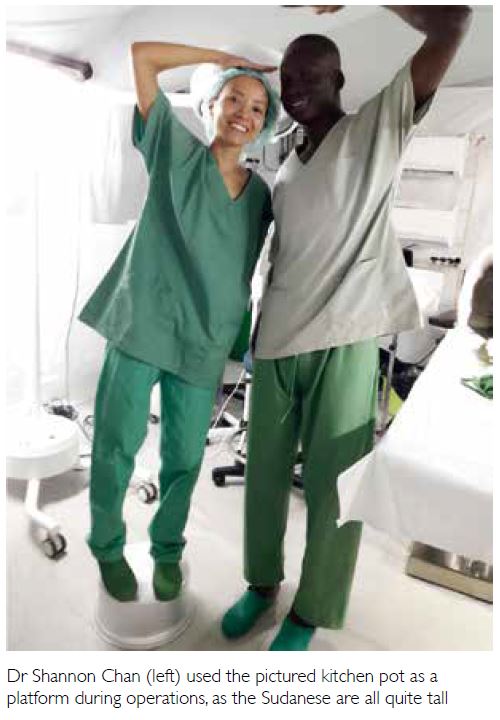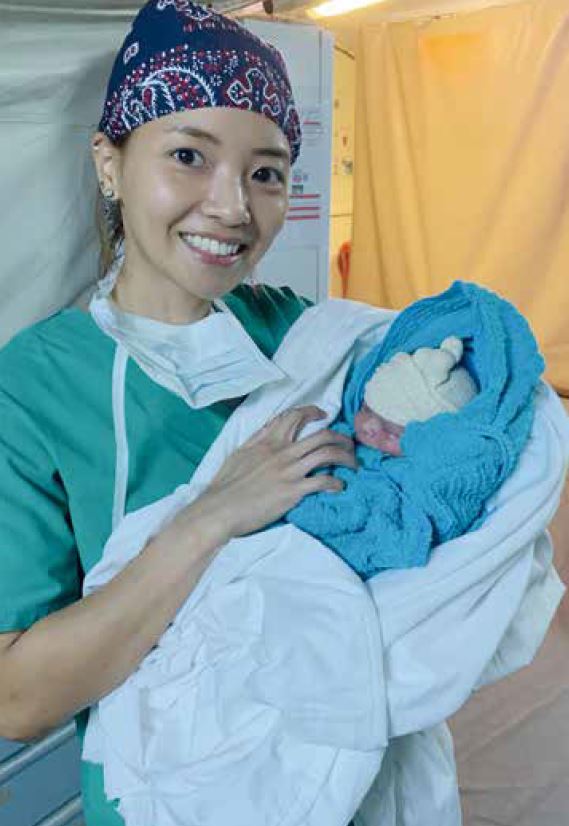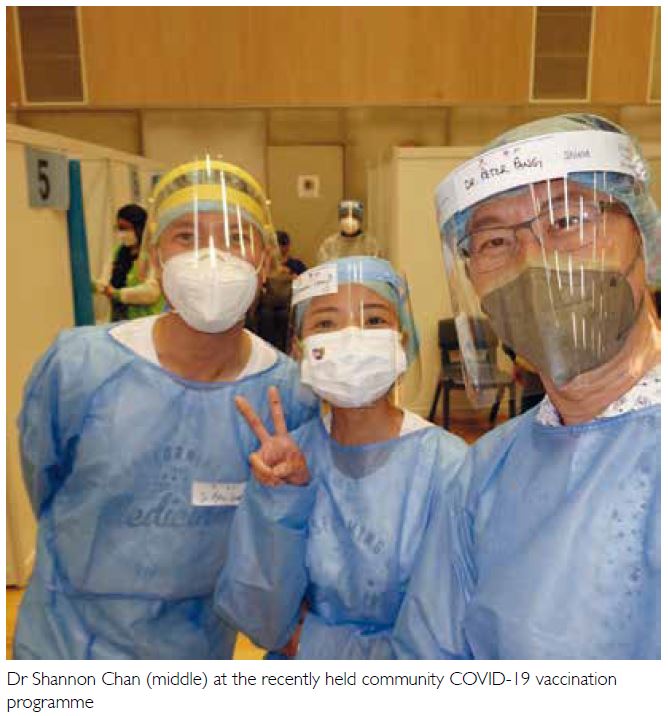© Hong Kong Academy of Medicine. CC BY-NC-ND 4.0
HEALTHCARE FOR SOCIETY
Hope and healing without borders: an interview with Dr Shannon Melissa Chan
Alex Q Liu1, Rex WH Hui2
1 Department of Surgery, Prince of Wales Hospital, Hong Kong
2 Department of Medicine, School of Clinical Medicine, The University of Hong Kong
Recently, there has been extensive news coverage of
the ongoing coronavirus disease 2019 (COVID-19)
pandemic and current geopolitical conflicts in
Eastern Europe. Although they often seem far from
Hong Kong, human conflicts and infectious diseases
have always been major causes of suffering around
the world. Dr Shannon Melissa Chan, an upper
gastrointestinal surgeon and assistant professor from
the Chinese University of Hong Kong, exemplifies
what doctors can do to provide help and a glimmer
of hope to those experiencing such humanitarian
crises.
Since completing her general surgery
fellowship in the Prince of Wales Hospital, Dr Chan
has been closely working with Doctors Without
Borders (Médecins Sans Frontières; MSF) to provide
surgical care globally. When asked about the reasons
behind her joining MSF missions, Dr Chan expressed
that it has always been a pursuit for her to serve the
less fortunate, and she felt that she could do more on
top of her usual duty of surgery, endoscopies, and
clinics. It was also to remind herself to reconnect
with her passion to help patients and save more lives.
The application process into surgical missions was not an easy one. Even as a young Fellow trained
in general surgery, Dr Chan initially did not fulfil the
technical requirements, as MSF expects a very broad
surgical exposure including orthopaedic procedures,
obstetric and gynaecological operations, simple
neurosurgical procedures, such as Burr hole, and
even nephrectomy. Dr Chan was not deterred, and
arranged a 1-month rotation to the obstetrics and
gynaecology department where she put in great
effort to gain as much knowledge and acquire as
much operative experience as possible. “I was
learning from trainees who taught me Caesarean
sections.” Dr Chan recalls. She even went to help
neurosurgeons and orthopaedic surgeons on her call
nights, assisting with emergency surgeries. With the
necessary experience completed, and annual leave
saved up, she was ready for her first mission.
Dr Chan’s first 3-month MSF mission was
to South Sudan in 2016. In addition to the usual
surgical conditions seen in Hong Kong, she was
exposed to a variety of new scenarios not previously
seen, ranging from arrow injury to schistosomiasis. Creative thinking was also often required because of
the limited available resources; she had to use kitchen
pots as surgical step stools during operations, and
created a make-shift ileostomy bag using a coffee jar
lid. During the 3-month mission, Dr Chan was able
to help many patients with her surgical skills. Even
the local witch doctor, who was initially sceptical
and discouraged patients from seeking help from
Western medicine, grew to respect her work and
the effective interventions. “The patients were also
very grateful,” Dr Chan explains, “and I would know
that because the next day I would find them self-discharged
from the hospital, leaving a chicken in
their stead as a token of appreciation.”
In late 2019, Dr Chan went on her second
MSF mission, this time to Mocha in Yemen. Mocha
is situated only 2 hours from an active war zone,
and Dr Chan experienced the ugly and destructive
power war up close. Every night, she could hear
explosives and gunshots, and injured civilians
would be transferred to her centre to be stabilised
and treated. She had to perform amputations for
many patients with non-salvageable limb injuries
due to landmines, and damage control operations
for those with multiple gunshots wounds. Dr Chan
also recounted how some patients succumb and
others who get caught up repeatedly in the armed
conflict. While as doctors we can heal individuals of
their medical conditions, we are unable to heal the
larger circumstances. However, Dr Chan does not
believe that the clinical efforts under these situations
are futile. Instead, the fact that there are doctors
available at all is already an act that preserves human
dignity. These efforts represent a message of hope to
the community. After all, to the war-torn region, the
beacon of hope is vital.
For her brave service with MSF, Dr Chan
was awarded the Hong Kong Humanity Award
in 2021. When congratulated, she merely said “It
was volunteering work to help people, and I never
expected there would be awards.” In a way, the best
reward has been the hope that she was able to sow in
those who she aided.
The deep care Dr Chan has for those in
need is not only limited to the overseas missions,
but also extends to those closer to home. Just
the weekend before our interview with her, she
was busy coordinating and participating in the
first part of a community COVID-19 vaccination
programme in Kowloon. The programme is
targeted mainly at kindergarten and primary school
students, improving the accessibility of COVID-19
vaccinations and protecting this vulnerable group
from the pandemic. For 2 days, Dr Chan and doctors
from multiple specialties provided 1300 jabs to
children. In addition, as part of the programme, there
will be collaborations with local non-government
organisations to arrange vaccination and clinical outreach services to the population of elderly living alone.
Even in her career as a surgeon-researcher,
Dr Chan displays her inclination towards
helping those less fortunate. With her interest
in pseudomyxoma peritonei, a rare entity that is
undertreated, she has been performing cytoreductive
operations on affected patients. Although these
complex surgeries take up extremely long hours, Dr Chan performs them gladly to give her patients a
fighting chance.
Dr Chan’s many endeavours demonstrate the variety of ways how doctors can contribute to the
community. Perhaps not everyone can meet the
stringent recruitment criteria of MSF, but as long as
we have the will to help, it is without a doubt that
everyone can find a way to bring hope to those who
need it.

Figure 2. Dr Shannon Chan (left) used the pictured kitchen pot as a platform during operations, as the Sudanese are all quite tall



